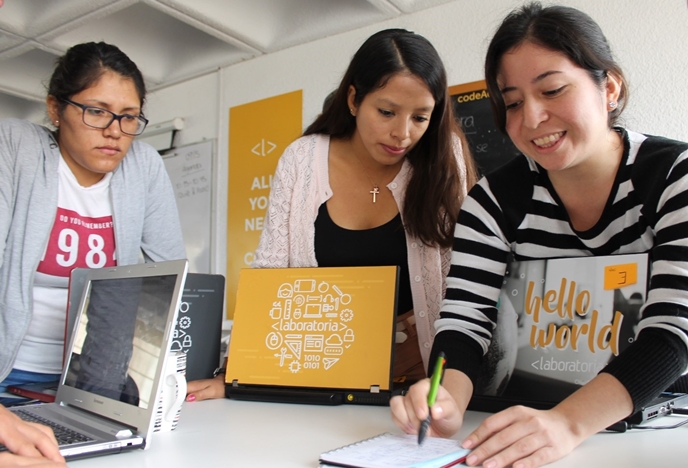ImpactAlpha, April 8 – Many Latin American youths lack the skills they need to succeed in an increasingly digital world. So do many companies in Latin America.
In Lima, Peru, Mariana Costa and her co-founders of the tech bootcamp Laboratoria confronted this tech skills gap themselves back in 2014 when they struggled to find talent for their web agency. When they did find candidates with the skillsets they needed, they were invariably male.
Rather than keep looking for more diverse tech talent, they decided to grow it themselves. Laboratoria’s first goal in training underserved, underskilled women was to supply web developers for their agency.
Laboratoria has since trained more than 1,000 women to be ready to join Latin America’s digital workforce. Most of the women have gone on to well-paying jobs gone on to work with software firms as well as companies like Facebook, Accenture, and Latin America’s banks and healthcare companies. Laboratoria runs a six-month coding program for low-income women who haven’t had the opportunity to go to university. It then helps them secure tech jobs once they graduate.
“We saw this as an incredible opportunity to identify talented young women who don’t have access to university education, teach them to program, and then connect them into these teams, so they can contribute [to] a more inclusive digital economy,” Laboratoria’s Gabriela Rocha told ImpactAlpha at the Foro Latinoamericano de Inversión de Impacto, or FLII, in February.
Mexican coding bootcamp Holacode secures backing from GINcapital
Economic mobility
For the women individually, graduating from Laboratoria’s bootcamp has a measurable impact on their earnings, quality of life and communities, Rocha adds. Most earn $800 to $1,000 per month—three to five times more than they could earn before the program.
The organization focuses on women because 76% of the 30 million Latin American youth who aren’t in school, training programs or holding jobs are women. Even among women who are in school, a majority struggle to transition to the formal workforce afterwards.
Laboratoria has expanded from Peru to Brazil, Chile and Mexico and has plans to add Colombia. Laboratoria has graduated seven cohorts of students since 2014—including two small pilot groups—and placed more than 80% of its graduates in tech jobs.
With 450,000 unfilled tech jobs across Latin America, Rocha says Laboratoria expects to see more demand for the skills it teaches, particularly as companies increasingly look for more diverse talent. “What’s interesting about the tech sector is that the demand is so large, they don’t necessarily require university degrees to hire programmers,” Rocha said.
Cultural shifts
Laboratoria is sensitive to the unintended consequences of women’s empowerment, both in the workforce and at home. To shift workplace culture, Laboratoria looks to place several of its graduates within each company simultaneously, so that the women can have a stronger voice and influence on what are often all-male teams. “We look for those companies that are really invested in creating more inclusive working environments,” Rocha says.
“At home, we involve the family as well,” she says. “We have a rigorous selection process to understand who these women are, why they are looking for something different, how their families feel about this. That support network throughout the program is really important for them to be successful. Laboratoria accepts only about 9% of the applicants who apply.
Pay-as-you-earn coding school Lambda raises $30 million for international expansion
“Many of them become the primary breadwinners in their homes. That means they have a lot more economic independence,” she says. “And they inspire other people in the community. It’s not rare that in the following selection process, we get a lot of friends, colleagues and neighbors of previous graduates we’ve had.”
“We hope to impact the lives of more women, to connect with more companies who are looking to transform the way they hire and the culture in their companies,” Rocha says. “We hope to become the main source of female tech talent in Latin America.”











